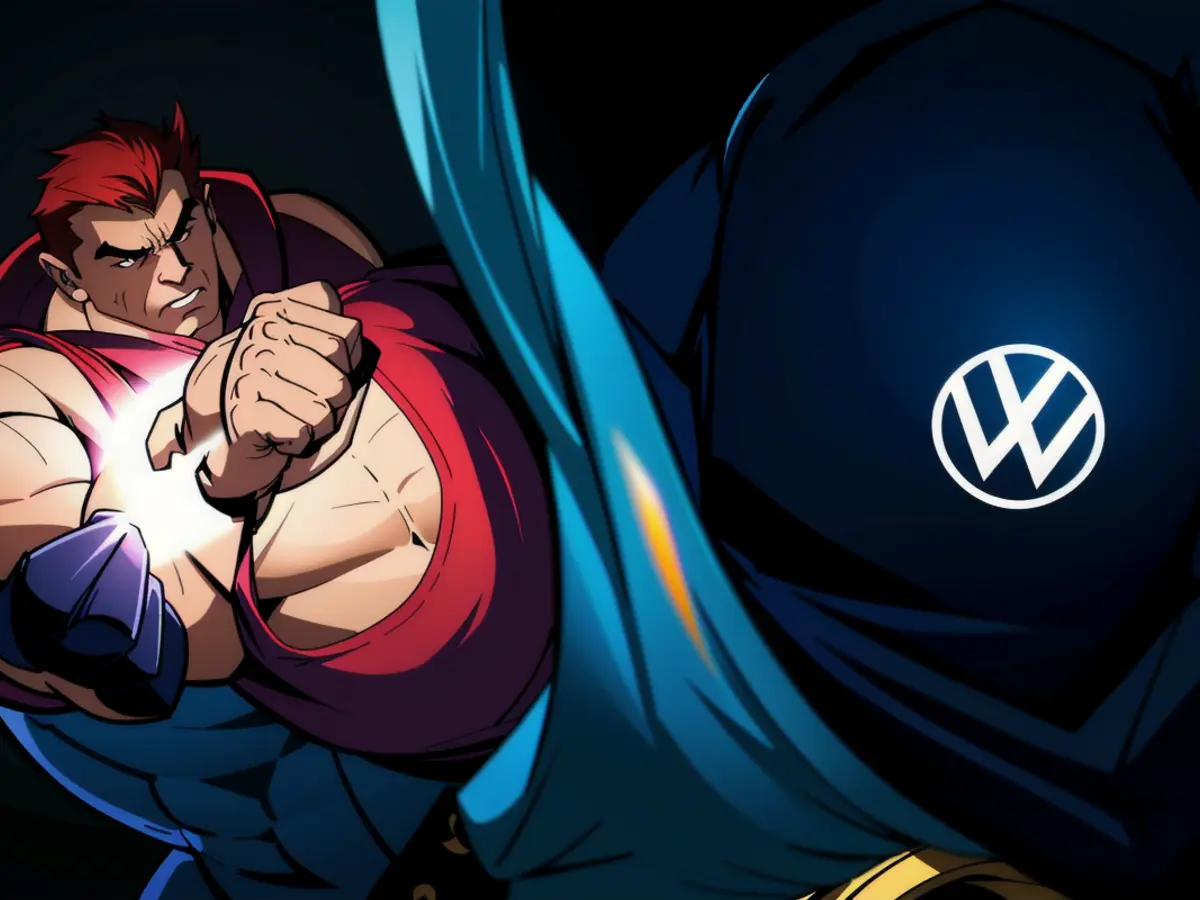"There should be room for a form of lethal sanction in political discourse"
Detroit, once the pulsating heart of the U.S. automotive industry, experienced a downfall. Car manufacturers filed for bankruptcy, followed by the city itself during the financial crisis. Andreas Knie, a mobility researcher, warns that VW and Wolfsburg could encounter the same fate. He attributes this predicted decline to "overconfident leadership" that disregarded clear warnings from China. Can this impending collapse be averted? Knie suggests adopting a humble attitude and acknowledging strategic errors. "If the customer desires something else, I'll produce something else," he explains in the "Climate Lab" of ntv. Despite the workforce booing their CEO during salary negotiations, substantial cutbacks cannot be prevented: "VW and Wolfsburg will hemorrhage and shall reduce their workforce by half," Knie predicts.
ntv.de: So you claim Wolfsburg will turn into the German Detroit?
Andreas Knie: It would be quite a journey for Wolfsburg, but decay is unavoidable. Detroit was not solely a car city but also Motown, where black music originated. Despite widespread poverty, the city was lively and diverse, with Grosse Point being the wealthiest neighborhood in the U.S. The decline began after the 1967/68 riots. When I visited Detroit in the early 90s, the heartbreak remained palpable. No trace of the past magnificence was left.
ntv.de: And what about Wolfsburg?
The imminent decline has been noticeable since the 2000s. The principal market for Volkswagen is China, and this market is shrinking. At one point, nearly 60% of cars were sold there. China explicitly stated in 2006 that it wanted a battery-electric future. Volkswagen, on the contrary, proclaimed: We're not interested in that. We'll forge our own path. I witnessed Volkswagen presenting its program in Shanghai and clarifying to the Chinese, with Audi colleagues, that they were making missteps and backing the incorrect technology.
ntv.de: So, Volkswagen went to China and proclaimed electric cars are rubbish?
Yes. Volkswagen exhibited arrogance in informing the Chinese about the direction of the world: Opt for diesel engines, which boast better performance, are more efficient, and are friendlier to the environment. As a result, the bitterness of this misstep now lingers. It's essential to name the root cause of the crisis, which is a continuous management failure spanning 15 or 20 years. Only then can talk about rescue commence.
ntv.de: Can Volkswagen and Wolfsburg be revived? That's not what you're implying.
Volkswagen, much like in the late 60s, found itself in a bleak situation. Only a single car model, the Beetle, was available. The boxer engine was outdated. Suddenly, Volkswagen's leading figure, Heinrich Nordhoff, passed away in 1968. Volkswagen appeared to be adrift, but wisely, they then purchased the then NSU Auto Union. Audi, in turn, provided Volkswagen with water-cooled combustion engines. The birth of the Golf ensued. At the time, Volkswagen managed to save itself by recognizing that it was off course.
ntv.de: Therefore, there's a playbook for reclaiming the automotive industry's pinnacle since Volkswagen is cooperating with Rivian to provide electric vehicle technology.
Volkswagen, in its essence, is the embodiment of Germany's corporatist model, where all interests are harmonized and balanced, including employers, employees, and the city. Although it won't file for bankruptcy, Volkswagen and Wolfsburg will hemorrhage and must lower their workforce by half. Value creation will decrease, resulting in plant closures. However, if you aim to salvage Volkswagen, the management must demonstrate some humility and acknowledge: We erred. This would be the initial step.
ntv.de: Must halve the workforce to revive Volkswagen?
I find it astounding that Volkswagen lacks flexibility. Although China remains its largest market, car registrations in China for combustion engines are declining while those for electric vehicles are increasing. Chinese customers desire electric cars, albeit different types than Volkswagen produces. Volkswagen's products for the European and American markets, moreover, are excessive and costly. Not due to high wages but because they still manufacture heavy cars -- with substantial metal and heavy doors that slam shut with a definite thud. It's essential to convey that this is a Volkswagen.
ntv.de: Aren't electric cars already of sufficient quality?
They're admirable, but their quality is often criticized. Electric cars, like smartphones, are durable hardware. Customers are intrigued by the car's software features, which are updated regularly via air interfaces. The car's battery can be charged remotely without visiting the workshop for the update. The car functions like a computer that can be switched on and off. This notion was unimaginable for German car manufacturers.
ntv.de: But is this solely a management issue? Many people in Germany still prefer combustion engines because they don't trust electric cars. If I travel to Italy on vacation, where should I recharge? How long will that take? These questions frequently arise.
People are pragmatic, and we've been evaluating this for 15 years, but we can't find this reluctance. People are well-aware that the future lies with battery electric vehicles. And those who've driven an electric car will never want to return. Yet, my younger sister recently went to a dealership to purchase an electric car. What did she encounter? No chance. It's best to wait.
ntv.de: Reason being, they won't generate any revenue from service at the workshop?
It seems it's difficult for the dealership to accept the reality of a rapidly shifting market. People are aware that the future belongs to electric vehicles, and they're eager to embrace this new driving experience. However, the stubbornness of some dealerships in resisting this change is noteworthy.
Sure, here's a paraphrased version of the text:
Yep, he's got no more tasks left. Electric vehicles essentially operate sans maintenance costs. My students and I have been engaging in test purchases for a decade, but German dealerships aren't keen on selling electric vehicles. There are no responses to queries like: Where can you charge them? Can power consumption be controlled or reduced? The dealer offered my sister a 500-page manual and informed her: If you read this, you'll understand. Despite this, my sister bought an electric vehicle, paying nearly double what she would for a conventional engine vehicle. There are no electric vehicles priced under 30,000 euros. And since the electric vehicle market isn't mass-market, there's also no used car market. Pioneers are, in essence, those buying electric vehicles in Germany.
Is it plausible to claim that Germany is a nation that solely supports combustion engine cars? This argument is gaining traction as politics first grants incentives to scrap or purchase conventional cars to boost the German economy.
Just take a look at the diesel scandal. You can still find cars with tampered software today. The Federal Motor Transport Authority is having a hard time removing them from the roads. Yet, it's treated as a minor offense. Consider a similar scenario in the food industry: A yogurt advertised with certain nutritional content turns out to be different upon opening. That would be a major scandal.
Yes. It's evident that there's a strong emotional bond with combustion engines. This sentiment is deeply ingrained in German culture. These are, indeed, advanced pieces of machinery. We excel in creating the best combustion engines globally. Diesel vehicles function as highly efficient, mobile chemical factories. However, no one's purchasing them anymore, particularly not at these rates. This isn't limited to China, Europe, or the U.S., but extends to Africa as well. The future, even there, leans towards battery-electric vehicles. However, the German automotive industry lacks the adaptability and pragmatism of the U.S. to acknowledge the customer's demands and adapt accordingly.
Can the ship be steered back on course?
Individuals like Herbert Diess have endeavored to do so. It's not as if everyone in Wolfsburg is clueless.
At that time, Elon Musk was a regular guest at VW.
Diess take Musk as a mentor, perhaps a bit too closely. This resulted in the loss of trust from the influential Porsche and Piech families, eventually ending the experiment. Currently, we need an individual advocating for a change in perspective at VW: Prioritizing software over hardware, producing more affordable products, and adopting a flexible approach to technology paths.
But aren't there two significant stakeholders in VW: the state of Lower Saxony and the most powerful labor union in Germany? Don't they also need to introspect given the crisis? They claim we need to reduce the workforce by half. But that's being opposed.
Both the new labor union and the IG Metall recognize change is necessary. Despite being in the minority, within the IG Metall, some individuals have advocated for constructing a different kind of vehicle for a long time. The old labor union had a close relationship with management and agreed with their suggestions. Hopefully, the new labor union chairman will establish a different culture and counterbalance management.
But isn't there a current demand to continue as before? If the factories aren't operating at full capacity and no one is laid off, aren't we essentially paying people for idling? Don't we have to accept job cuts during a crisis, and that these individuals could even be redeployed to future industries in need of skilled workers?
Indeed, we Germans are resistant to change and risk-aversion. Trial and error? No thank you. No experiments, please.
Perhaps a new federal chancellor will be elected in February. Will the situation in Germany improve with this, or will we return to the administration of the Merkel era?
To be frank, progress was better under the grand coalition than the traffic light coalition, but mainly due to the FDP. However, all parties now know that industrial policy needs to be handled differently today, even against opposition. You can't save everything—it's important to accept some form of economic euthanasia. We lack this in Germany, which is why we've kept coal and steel industries alive for too long. Individuals can and want to change, but they also need the opportunities to do so.
Andreas Knie spoke with Clara Pfeffer and Christian Herrmann. The conversation was edited for better comprehension and made more seamless. You can listen to the full conversation on the "Klima-Labor" podcast.
Despite the criticisms and boos, substantial cutbacks within Volkswagen cannot be avoided. Knie predicts that VW and Wolfsburg will "hemorrhage" and will reduce their workforce by half due to the shift towards electric mobility.
Furthermore, the main market for Volkswagen is China, and the demand for combustion engine vehicles is decreasing while that for electric vehicles is increasing. Volkswagen needs to acknowledge their strategic errors and produce vehicles that cater to the customer's desires in order to survive this impending collapse.








